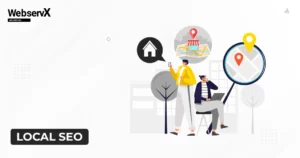SEO “Search Engine Optimization” is a set of techniques and processes aimed at improving a Website’s online visibility in a search engine like Google, with the goal of getting more traffic organically.
In simple terms, SEO is about fulfilling the user’s search query and needs by creating relevant and high-quality content and providing the best possible content and user experience.
The main benefit of ranking for the relevant content is that you can get “Free (organic)” traffic to your site. The No.1 organic search result is 10X more likely to receive clicks than other pages ranking in the 10th position.
And this is where the SEO enters the picture.
Search Engine Optimization(SEO) plays an important role in improving your website ranking position.
Better ranking means more traffic.
Whenever we talk about the term “SEO”, we’re talking about ranking your site higher on the Organic search results.
But the biggest question is,
How do you land on these results? How do search engines like Google actually work?
The ultimate goal of any search engine is to make the searcher happy and Google does the same find the best results page and serve them as the top search engine results.
When you search for something on Google or any other search engine, an algorithm works in real-time to bring you what that search engine considers the best.
But,
How does Google determine the “Best Results?”
Google always remains coy about its ranking metrics and has never been open about its ranking factors but based on the experts’ research and analysis from the search engines it is said that crawlers and bots are used to gather data available on the internet.
By using website navigation, internal and external links, which the bots understand and the context of the web page search engine offers the other pages with better online visibility as the best results.
The website and web pages are ranked according to Relevance, Authority, and Usefulness.
So your job as a website owner is to help search engines crawl and index all the pages on your site that you want them to know.
You can ensure the crawlability and indexability of your website pages through a number of actions and best practices referred to as Technical SEO.
Now that you know how Google finds the best results and categorizes pages it is time to take a closer look at:
How Does SEO Work?

As we discussed before Google uses a relatively complex process, known as “Algorithms” to rank pages. These algorithms take into account a vast number of factors to determine whether the specific page should rank or not.
To rank on Google, you don’t need to know how search algorithms work (and actually, nobody knows it with 100% certainty).
However, knowing the basics can help you with a better understanding of How SEO works and what it takes to optimize your website or any other page to rank.
Search engine results are separated into two distinct categories: Organic Results and Paid Results.
For Paid Results you have to pay to be there at the top, through PPC advertising and for Organic Results you just need to earn your ranking, through SEO.
You may ask: why not just pay and rank?
The answer is just so simple. The majority of the time people just ignore the ad or paid results and instead click on the organic results.
Yes, it’s true that SEO takes more time, and effort and focuses on “Free” organic traffic and resources.
Once you rank for your targeted keywords, you can reach more audiences and generate passive traffic that doesn’t disappear from the movement you stop paying for.
As Organic search results are natural results that rank based on 100% metrics there is no way you can pay Google or other search engines to rank higher in the organic search results.
Google uses the following strategies to find and rank organically:
-
Crawling
Google uses “Bots,” to crawl the website and look for new or updated content or pages. Google to find a page, the page should be indexed or should at least have a link directing it.
-
Indexing
Next, Google tries to analyze each page and tries to make sense of what the page is all about and then may store the information in Google’s huge database for webpages.
-
Results
When users search for the query, Google determines the page that is best, in terms of both quality and relevance, and ranks the top in the SERP.
SEO encompasses two primary categories: on-site (on-page) and off-site (off-page) optimization. When executed effectively, these strategies collectively address the various ranking factors that influence a website’s search engine performance. The division of SEO into two categories typically involves:
- Keyword Research.
- Content creation and optimization.
- Link building.
- Technical Optimization.
By efficiently integrating these components, you can improve your SEO efforts and enhance the exposure of your website, ultimately leading to higher search engine ranks and more organic visitors.
Types of SEO
-
On-page SEO

All technical measures you take on your website to make it rank higher on search engines come under this. It includes optimizing the meta description and meta titles of your page, adding Internal Links, URL optimization, Image Optimization, Content Optimization, Website structure, and more.
On-page SEO basically deals with website content in order to rank on search engines and acquire traffic. So your website should have content that is easily understandable.
The main objective of Google is to prefer content that is helpful and most relevant. These are the points you can add to your website for better ranking and on-page optimization.
- Use targeted keywords for each and every important webpage and content of your site.
- Optimize the page meta titles to target those keywords.
- Update the description of your service or product.
- Add fresh content or a blog to your website.
- Update the structure of your website, blog, or service page.
- Structure your content through the right HTML tags.
- Come up with a new content plan for each stage of the customer journey.
Remember if the content of your website is not targeting your specific keywords or is generally unhelpful, you might need a better on-page SEO strategy.
-
Off-page SEO

It is precisely what it sounds like. All these factors are done Off your website and on the other parts of the internet that could influence your site’s ranking. One of the significant aspects of Off-page SEO is having high-quality backlinks.
But Off-page SEO is not only about getting backlinks, it’s more than that. It also could look like:
- Managing your social media presence.
- Conducting PR campaigns and collaborations.
- Creating content for different platforms.
- Managing reviews and comments.
- Keep an eye on spammy backlinks.
-
Technical SEO

Technical SEO focuses on backend factors of your website that impact crawlability, indexability, User Experience(UX), site speed, mobile friendliness, and more. A better technical SEO can let search engines and audiences or people easily interact, navigate, and understand your site.
Slow page speed, broken links, and images or difficult navigation hurt the user experience and are considered Bad SEO, these are some facts of Technical SEO to be included in your strategy.
- Conduct a technical review and site audit.
- Fix all your duplicate content
- Use the robots.txt file to tell Google how to crawl your website.
- Have a clear sitemap.
- Optimize your files and image size.
- Migrate your website.
- Design your site mobile-friendly.
Make sure your website is easy to navigate for both search engines and your audience because if humans can’t navigate to the most essential page of your website, search engines can’t either.
So make sure your website is well-structured and easy to navigate.
-
Local SEO

Businesses that have a physical presence or store and want to increase foot traffic can use Local SEO.
Optimizing your website content or on other platforms like Google My Business can help you put your website and brand in front of an interested audience.
Let’s just say you need to get a Digital marketing service in your particular city. The options you see, when you search on Google, are the businesses with the best Local SEO and best services.
Local SEO typically consists of
- Manage online citations.
- Set up your Google My Business account.
- Track and target local keywords.
- Create site content that targets local audiences.
- Leverage local connections to Build backlines and collaborations.
But this is not limited to this, the list above is just about the specific actions that directly affect the Local ranking (In addition to the Standard SEO practices) to know more about Local SEO check out our blog to improve your ranking.
-
International SEO

Optimizing your site to drive traffic from multiple regions and languages is the ultimate goal of International SEO. You allow your target audience to make a purchase in their language and currency and can address them appropriately in their cultural context. To do so you need an excellent International SEO strategy.
International SEO typically consists of Content, Targeted audience, Relevant keywords, better internal linking, and competition.
Why Your Business Needs to Invest in SEO?

Many brands and businesses know (or think they know) why they need SEO for their business and the benefits they will get from a better SEO strategy.
SEO will certainly help your business improve search rankings and visibility, but let’s see the real benefits of investing in SEO:
-
Investing in SEO Boosts your website’s Organic Traffic.
Organic and Quality Traffic is essential for ensuring that your website’s targeted audience or customers will likely get the most exciting products and services and find your brand online.
SEO helps you to ensure that your customer and target audience search for the keywords relevant to your product or service and find your online business.
As SEO helps boost your website ranking on search engine results, more potential clients interested in your product or service will also find your brand, resulting in an increase in organic traffic to your website for your business.
-
Investing in SEO Increases Brand Awareness and Credibility.
Building brand awareness, recognition, and credibility is crucial for establishing a loyal customer base that will keep returning to your website and attracting new customers.
With a solid foundation and SEO strategy focusing on your content, SEO can help you create informative and helpful content that will reach your target audience or customers.
When the audience finds that your website content and website helps them and answers their problem or provides them with a solution, they are more likely to visit your website as an expert in the industry and improve your brand authority and credibility.
SEO also helps your website increase brand visibility so that more customers will interact with your website and, as a bonus, increase your brand awareness.
-
Investing in SEO Improves User Experience.
Creating a seamless user experience is essential for keeping your website and customers browsing your products and services until they are not ready to purchase. A poor user experience can increase the bounce rate to 85%, and the customer starts shopping from your competitor’s website.
Even search engines also consider user experience as a high-ranking factor same as content on the result page. SEO helps you to improve user experience by crafting a solid strategy.
-
Investing in SEO Improves your Business ROI(Returns On Investment).
The ultimate goal of any business or brand is more likely to achieve the best results and ROI for the marketing efforts.
And fortunately, SEO can help you.
SEO works hand-in-hand with other strategies like content marketing, digital marketing, and online advertising. Using an SEO strategy can help you ensure that users find your marketing campaign or new content online.
By working with other digital marketing campaigns SEO boost the success and attract more customer through their online channels. As a result, you can enjoy the increase in sales and revenue of your business or brand which ultimately increases the ROI of the business.
-
Investing in SEO Improves your Business Search Ranking for the long term.
This is one of the most important and best benefits of SEO, to boost your business ranking for a long period of time. Unlike many other traditional methods and marketing campaigns, SEO is an ongoing and long-term strategy.
SEO helps you continuously stay updated with the changes in search engines and optimize your website and content so that you can continually improve and attract more potential customers to your website.
You can continue doing it to see the results years after you invested in it. Investing in SEO, for your business allows you to grow your business and reach new heights of success.